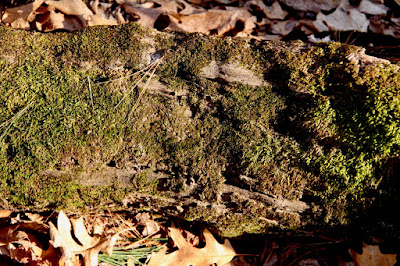 |
| moss growing on a fallen tree
Photo by J. Harrington
|
We've learned all we know about mosses (precious little though it is) from reading Robin Wall Kimmerer's Gathering Moss: A Natural and Cultural History of Mosses. The existence of mosses on fallen tree trunks and the uses that woodpeckers and those that depend on their cavities make of dead standing trees tempers our desire for a neat, clean, uncluttered wood lot. We're still trying to sort out the ecological role played by fallen trees and how much we can "tidy up" our woodlot without doing serious damage to those that share the neighborhood with us. If we had more ruffed grouse around, and one or more of them used any of our fallen trees as a drumming log, the question would be settled. We've had a soft sport for grouse for all our adult life. Still, there's our intermittent atavistic desire to enjoy a blaze in our fire pit from time to time. We think we've once again reached the point at which "a little knowledge is a dangerous thing." The fact that we've cleared the driveway and thus gathered a bunch of fallen, dead branches from last week's storm(s) will hold us for now. Trying to find a responsible balance point in moderation is an ongoing challenge but at least we don't have to travel hours every day to gather firewood needed for family cooking and to keep a hearth fire going.
The Forest
You should lie down now and remember the forest, for it is disappearing-- no, the truth is it is gone now and so what details you can bring back might have a kind of life. Not the one you had hoped for, but a life --you should lie down now and remember the forest-- nonetheless, you might call it “in the forest," no the truth is, it is gone now, starting somewhere near the beginning, that edge, Or instead the first layer, the place you remember (not the one you had hoped for, but a life) as if it were firm, underfoot, for that place is a sea, nonetheless, you might call it “in the forest," which we can never drift above, we were there or we were not, No surface, skimming. And blank in life, too, or instead the first layer, the place you remember, as layers fold in time, black humus there, as if it were firm, underfoot, for that place is a sea, like a light left hand descending, always on the same keys. The flecked birds of the forest sing behind and before no surface, skimming. And blank in life, too, sing without a music where there cannot be an order, as layers fold in time, black humus there, where wide swatches of light slice between gray trunks, Where the air has a texture of drying moss, the flecked birds of the forest sing behind and before: a musk from the mushrooms and scalloped molds. They sing without a music where there cannot be an order, though high in the dry leaves something does fall, Nothing comes down to us here. Where the air has a texture of drying moss, (in that place where I was raised) the forest was tangled, a musk from the mushrooms and scalloped molds, tangled with brambles, soft-starred and moving, ferns And the marred twines of cinquefoil, false strawberry, sumac-- nothing comes down to us here, stained. A low branch swinging above a brook in that place where I was raised, the forest was tangled, and a cave just the width of shoulder blades. You can understand what I am doing when I think of the entry-- and the marred twines of cinquefoil, false strawberry, sumac-- as a kind of limit. Sometimes I imagine us walking there (. . .pokeberry, stained. A low branch swinging above a brook) in a place that is something like a forest. But perhaps the other kind, where the ground is covered (you can understand what I am doing when I think of the entry) by pliant green needles, there below the piney fronds, a kind of limit. Sometimes I imagine us walking there. And quickening below lie the sharp brown blades, The disfiguring blackness, then the bulbed phosphorescence of the roots. But perhaps the other kind, where the ground is covered, so strangely alike and yet singular, too, below the pliant green needles, the piney fronds. Once we were lost in the forest, so strangely alike and yet singular, too, but the truth is, it is, lost to us now.
********************************************
Thanks for visiting. Come again when you can.
Please be kind to each other while you can.
No comments:
Post a Comment